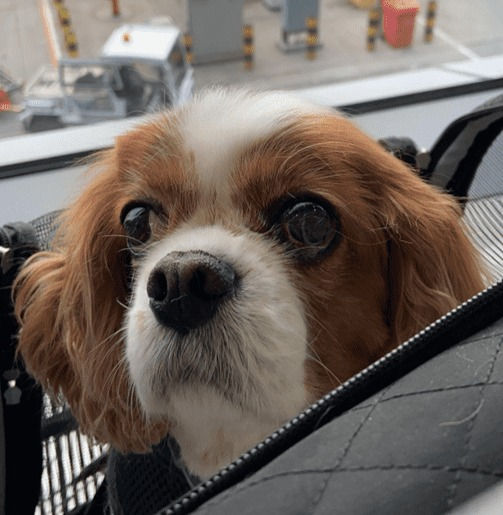The Economic Case For Why Dogs Should Travel
- Brainz Magazine

- Aug 29, 2023
- 6 min read
Written by: Lauren Anders Brown, Executive Contributor
Executive Contributors at Brainz Magazine are handpicked and invited to contribute because of their knowledge and valuable insight within their area of expertise.

For ten years, I traveled with my dog, pictured here on one of our 75 flights to any of the nine countries around the world we visited together. Navigating all the logistics was one challenge and the inspiration for my new startup, PadsPass™. The other consideration was always the financial one, because traveling with a dog comes with costs. Those costs were outweighed by the support my dog offered me and the memories made. As a millennial fur-mama without human children, I was on the early end of those willing, wanting, and demanding to be able to travel with their dogs. Ten years ago, it seemed like an unnecessary and frivolous concept, today there’s financial sense as to why dogs should travel.

The economic case for dog travel can be seen from multiple perspectives, each of which contributes to economic activity and growth. In the US alone, there are 90.5 million households
that have pets. Of this, 78% travel with them, and from that number, 60% travel internationally. This equated to just over 42 million US households that travel internationally with their pet. While dogs don't typically travel alone because their humans hold their wallets, their travel often accompanies human activities, leading to various economic benefits. Here are a few aspects to consider:
The starting costs
The pet industry is a significant contributor to the economy. When dogs travel with their owners, they require various products and services, starting with their passage on their chosen mode of transportation. For pets that can travel under the seat on an airline, international travel starts at a $200 fee to a commercial airline or higher if the dog is larger to purchase a seat or flies on a private carrier which can cost upwards of $10k. If an animal travels in cargo, a UK pet shipping company I’ve used called Fetchapet has a helpful matrix to determine how much it costs which is anywhere from £950 to £5050. After the airline fee, the next immediate cost is any government entry or import permit fees, these also fluctuate at extremes of either no cost, like for most travel to the US and all travel to Bermuda, or be as costly as £490 for an in-cabin service animal to enter the UK. Most countries require specific health checks by a veterinarian and airlines will have requirements for the sizes of pet carriers or crates. Then there are the additional travel accessories and grooming services to ensure your dog is clean and healthy to travel. This creates demand for a wide range of businesses, from pet supply stores to grooming salons, thereby generating economic activity and supporting jobs.
Tourism
Dog-friendly travel options can boost tourism in certain areas. Many people choose travel destinations and accommodations based on their ability to bring their dogs along. Dog-friendly hotels, parks, beaches, and attractions can attract a niche market of pet owners, leading to increased tourism revenue for local economies. We took two trips to Sonoma, California two years in a row based on the dog-friendly nature of the area and we’ll definitely be booking another trip there in the future.
Transportation
Dogs often travel with their owners by air, train, or car. This generates revenue for transportation companies, including airlines, railways, and pet-friendly taxi services. Traveling with pets may also influence transportation choices, leading to higher demand for larger vehicles or pet-friendly travel options. Where I am based in Bermuda, we’re lucky to have all the commercial airlines that allow for small dogs to travel under the seat in front, and a new one, BermudAir, that will allow for a seat to be purchased for larger dogs. There is also Private Jet Club, which shares seats on private planes and accommodates Very Important Pups of all sizes.

Hospitality industry
Dog-friendly accommodations, such as hotels and vacation rentals, can attract a broader clientele by catering to pet owners. This can lead to increased bookings and occupancy rates, benefiting the hospitality industry and associated local businesses. I came over to Bermuda (where I am writing this) for a long weekend, when the WHO declared the pandemic. My partner is a doctor and was asked if he’d be willing to stay on the island while it went into lockdown, which included shutting down the airport and the hotel we were staying in. My only non-negotiable condition for agreeing to this uncertain plan was that we absolutely had to have a dog-friendly hotel to stay in. We ended up at the MOST dog-friendly hotel on the island, The Loren, and the entire staff knew our dog’s name more so than my own (which ironically is the same name as the hotel). To this day, we still frequent the hotel for dinners and events because of its dog-friendly nature and high-quality food and service.
When we ended up eventually having to move out of the hotel, we only looked at dog-friendly vacation rental options and ended up spending weeks at the same place and building life-long friendships between both the humans and the dogs that lived in the main home on the property. Having dog-friendly hotels creates a sense of loyalty, for the dogs as well as the humans. Also, I’m a believer that if you don’t want my dog, you don’t want my money and I will always prefer to frequent places and restaurants that welcome both two-legged and four-legged patrons.

Exercise
Many outdoor activities, such as hiking, camping, and boating, are popular among dog owners. Destinations that offer dog-friendly outdoor recreational opportunities can attract visitors who are willing to spend on lodging, equipment rentals, and supplies, thus contributing to local economies.
Pet services
Mobile grooming is now more common than mobile haircutting for humans. While traveling, dog owners may utilize local pet services like dog walking, pet sitting, and daycare. These services are essential for travelers who want to explore without leaving their dogs behind. The growth of such services can lead to new business opportunities and job creation.
Health and wellness
Dog travel can promote physical and mental well-being for both dogs and their owners. Engaging in outdoor activities and exploring new environments can contribute to improved mental health and a more active lifestyle, potentially reducing long-term healthcare costs. I honestly would not have been able to travel as much if it weren’t for the company of my dog, and I am not alone. About 34 million pet owners in the US opt to stay home with their beloved furmily members due to the difficult nature pet travel has imposed in the past.

Events and activities
Ever heard of Barkus? It’s the parade that happens during Mardi Gras that is a parade of you guessed it – dogs. Dog-centered events, such as dog shows, agility competitions, and pet-friendly festivals, can attract participants and attendees. These events drive spending on event tickets, accommodation, dining, and souvenirs, contributing to local economies.
Pet healthcare
Leaving the mode of transportation to one side, the biggest ticket item overall for pet travel is the cost of staying up-to-date with vaccinations, health checks, and preventative medications. Some countries require government vets to complete paperwork, such as the USDA, and this comes with a higher cost than a non-USDA veterinarian to complete paperwork. Since the
pandemic, there has been a rise in pets needing veterinarian care. In the US alone, 23 million families adopted a new pet during the first year of the pandemic and veterinarians have directly felt this impact of the pandemic pet surge. The result of this I have felt when trying to book an appointment in a visiting destination and being told flat out they were not willing to take on any new animals. This is a logistical challenge when it comes to pet travel because the animal in question is not intending to be a full-time client but rather a one-off appointment. This has led to a rise in concierge pet services, who often will come to your accommodation and complete the required paperwork while you can continue to sip on your poolside drink of choice. It has in fact opened up a whole new market for pet healthcare. It is a huge benefit for the veterinary industry and supports pet healthcare professionals in dog-friendly destinations.
In conclusion, the economic case for dogs traveling revolves around the wide-ranging economic activities they stimulate, from pet-related industries to tourism, transportation, hospitality, and more. While the direct economic impact of dog travel may not be as substantial as some other industries, we are still talking about millions of pets looking to travel and move money. Its cumulative effects across various sectors can contribute pawsitively to local and national economies.
If you or someone you know is interested in learning more about how to travel with your pet internationally, take a look at my digital pet passport PadsPass™ and follow on Instagram, Facebook,LinkedIn and visit my website for (p)updates as the platform goes live and becomes available for use.

Lauren Anders Brown, Executive Contributor Brainz Magazine
Lauren Anders Brown is an award-winning documentary storyteller who uses film, photography, audio, and her writing to focus on issues of global health and human rights. She has captured content in over forty countries, including conflict zones, in order to amplify the voices of others and especially women. She produces work through her own production company colLABorate: ideas and images, works as a consultant for the United Nations, and is Creative Director of the e-learning startup Gamoteca. She is a true artivist: an artist who uses any and all of her available platforms to creatively advocate for human rights.





